#Catholic Perspective
Explore tagged Tumblr posts
Text
Watching The Deliverance: Pushing My Horror Movie Boundaries
Curious about The Deliverance? 🌙 As someone who avoids horror, this film surprised me! Check out my latest blog post for my thoughts on this supernatural thriller. Fellow scaredy-cats, this one’s for you! 👻 #moviereview #TheDeliverance
So, I did something out of character today—I watched The Deliverance. If you know me, you know that I’m a big baby when it comes to horror movies, especially those involving exorcisms or anything of that nature. Usually, I steer clear of them, but a Facebook friend mentioned watching it, and my curiosity got the better of me. Growing up, my grandma always warned us about these kinds of movies.…
#Based On Real Events#Catholic Perspective#Exorcism Movies#Have a Cup of Johanny#Horror Movie Review#Paranormal Thriller#SaturdayMovies#Scary But Not Too Scary#Supernatural Films#The Deliverance
0 notes
Text
Precisely it means Jesus being present in the tabernacle in the form of the Host. On Holy Friday the Host is removed from the tabernacle and transfered to a tomb as a sign of Christ's death. The eternal lamp is turned off and the church remains dark until the Easter Vigil/Resurrection, when the Host is returned to tabernacle. In some churches there's another eternal lamp in the tomb, which is turned on during the Host's presence there.
Do you want to know what keeps me up at night?
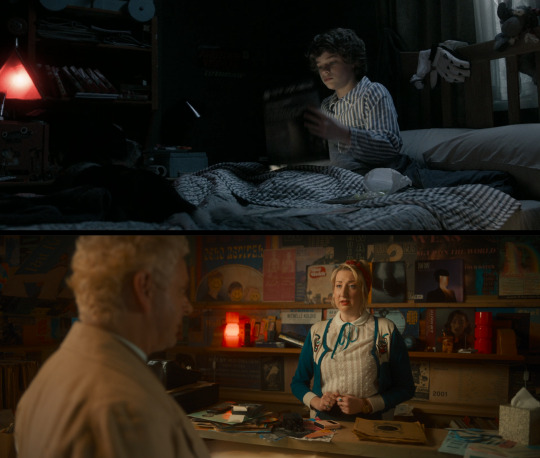
That one red light on the left.
2K notes
·
View notes
Text

happy brigid's day 🍀
#brigid#disclaimer this is not christian saint brigid but the Irish pagan goddess#while also being from the perspective of modern Ireland where I've been influenced by the Catholic appropriation of her etc etc
123 notes
·
View notes
Text
Trafalgar Law and Faith
Pre-emptive warning this is going to be another LONG metapost/analysis. There’s a lot I could talk about here but for the sake of structure I’m going to split this into three sections, i.e. the main ‘faith transitions’ that Law has gone through in the narrative thus far: 1. Flevance (catalyst for loss of religious faith), 2. Corasan (martyr that figuratively and literally saves law by giving him something to live for, introducing the will of D.), and 3. Luffy (cementing faith in this new belief system and regaining trust in the goodness of humanity through the living embodiment of everything Corasan believed in).
Before we get into all that though, let’s establish that Christianity is a thing in one piece. Speedrunning through some visual examples that come to mind; the Flevance church and nun (holding a celtic cross - censored in the anime version), a nun literally praying to God right before Marineford, Vinsmoke Sora’s grave marked with a cross (is op Christianity a northern thing?), Usopp and Chopper having crucifixes and holy water whenever ghostly stuff is brought up, Kuma and his trusty bible, the religious symbols on Kikoku’s hilt (could instead be more a reference to the Red Cross/symbol of humanitarian and medical aid as a doctor) and especially in whatever Mihawk’s got going on (though this could just be a Japanese cultural thing with Christianity being a minority religion or Oda just finding that some of the iconography, y’know. looks cool). There are also many other references to other religions e.g. hinduism, shintoism, buddhism, etc. Whether op forms of religion are the same as the real-world ones is debatable, and yes, Law being canonically raised as a devout catholic schoolboy with all the religious trauma associated with that is comical, but let’s take it all unironically for a hot minute. For fun.
1. Flevance
Law’s birthplace (Flevance) is described as being, at one point, “a very wealthy country with an unearthly beauty about it, with pure white soil and plants, like some kind of snow kingdom in a fairy tale.” The country’s wealth came from the very bedrock it sits on — white lead, which could be used to make various high quality products like tableware, cosmetics, weapons etc. When the wider world heard about this everyone wanted a piece of Flevance (the World Government also getting involved with distribution), and very quickly white lead became a “bottomless well of money”. So, hooray. Law gets to grow up in a rich city in a big house with educated doctor parents and probably gets to go to private school on weekdays and festivals with his family on weekends. One problem. In their greed, the Government and royalty have been knowingly hiding the truth about this supposed goldmine from the beginning. White lead is a toxic poison. Mining it from the ground over the last century and putting it in so many everyday products has resulted in it accumulating in the citizens’ bodies and leading to amber lead sickness, shortening their life-span with each successive generation – with the children of Law’s generation fated to die out before they reach adulthood.
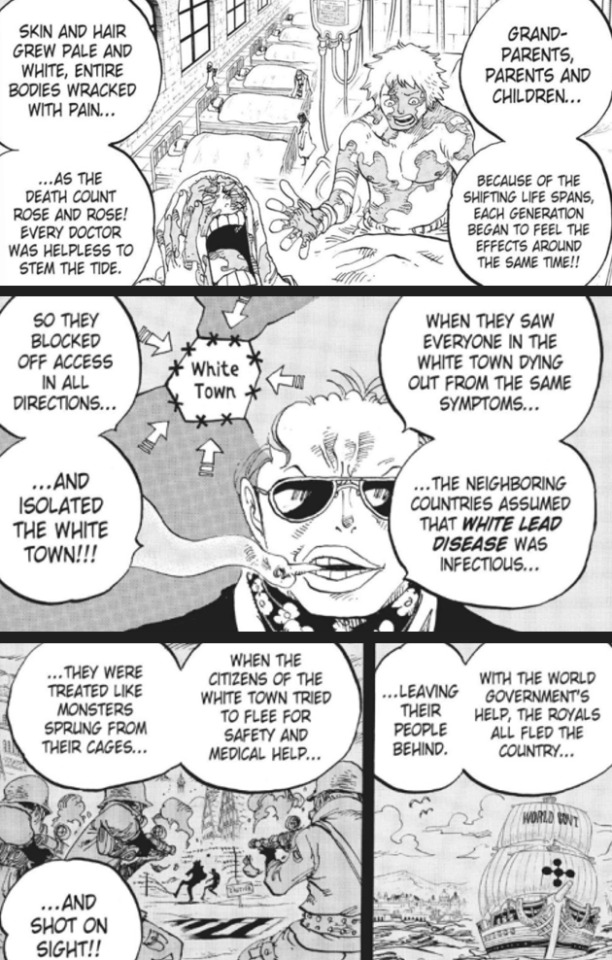
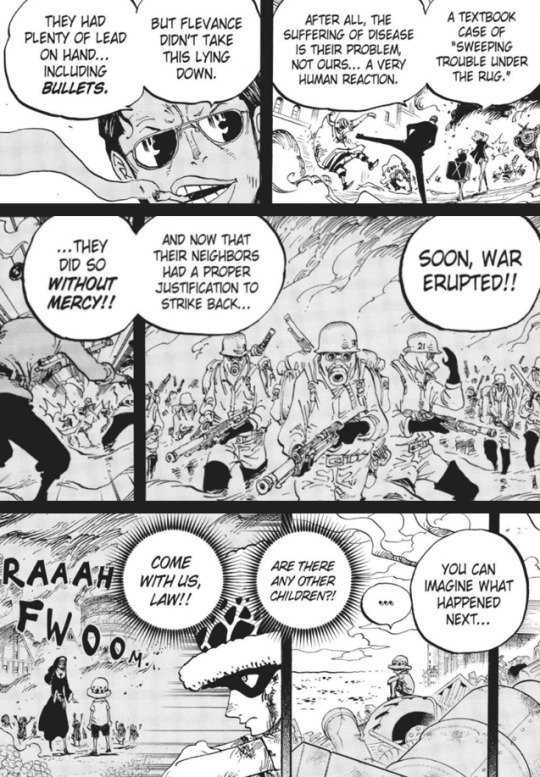
In the bible (especially in the old testament), God often inflicted these insanely disastrous events upon humanity, usually as some kind of punishment for their wrongdoings or as a test of their faith. Some events of which include (but are not limited to): famine, outbreaks of disease and natural disasters (e.g. hail, wildfire, earthquakes, floods). Historically, these stories played a key role in how humanity interpreted meaning from horrible disasters (e.g. assuming bubonic plague was sent as a punishment by god). Fire imagery is very common among these disasters as a representation for hell, which is clearly reflected in the destruction of Flevance.
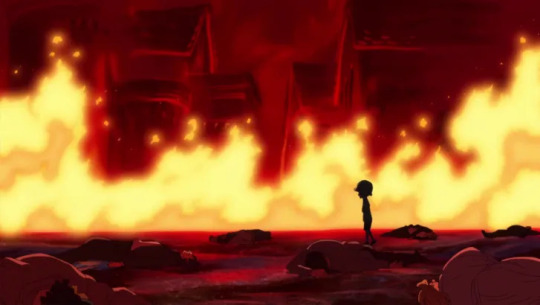

Sometimes these disasters had sole survivors act as messengers for God. With that context, let’s put ourselves back in the shoes of a ten-year old Law. Raised religious, freshly traumatised from losing his home, his devout family, all the comforts of his life, and having the outside world completely abandon him, this kind of event is likely going to be processed as some form of divine punishment. Law stumbles through hell, finds all his dead classmates, and the last words of sister nun echo through to him here. Merciful and salvation are huge catholic buzzwords – promises of holy compassion, deliverance and hope – and all of it fire and smoke and riddled with bullet holes before him. A genocide funded, perpetuated and covered up by the same body Law was promised was there to save them. And the only reason Law hadn’t died with them was because he wanted to stay with his little sister Lami, who was on her deathbed, and his parents, who were themselves trying to help the afflicted citizens, Law’s own father (before he was shot and killed alongside his mother) begging for more doctors, fresh blood, anything the world can offer, and asking “Why doesn’t the government announce to everyone that white lead is not infectious?”
Oftentimes (and in the case of Law), when there’s a promise of heavenly intervention or some miracle that doesn’t follow through, it results in an ultimate feeling of betrayal and anger. Unfortunately a lot of Catholic teachings also use a lot of guilt, essentially teaching people that the bad things that happen to you are your fault and there needs to be some sort of penance (queue Law’s survivor’s guilt that carries on down the road). But also, if this was supposed to be some divine punishment, for what exactly? For the town being blinded by the incredible wealth they were sitting on? Being lied to? Continuing to extract their livelihood, ignorant of its dangers? Punishment for who? His parents? His innocent little sister? For ten year-old Law? These people who believed in God, who were good people? That’s fucking stupid. None of these people suffered and died for any reason at all — certainly not for a sacred one. God hadn’t saved a single one of them. Law had to crawl out of hell himself by sneaking over the border under a mound of corpses.
Given everything that happened here, Law has every reason to fall into nihilism, and you can see how his upbringing would’ve bred a lot of the feelings of guilt, anger and resentment that you still see in Law (which would suggest that though this is where he likely cuts ties with the religious/Catholic component of his faith, growing up with these teachings in his formative years would definitely influence underlying beliefs about how the world works, and how Law behaves and subconsciously processes information), but at the same time, there’s usually some form of redemption and changes to how these patterns of behaviour can be approached later down the line.
2. Corasan
Fresh off witnessing his whole world burning down around him, Law meets Corazon at the very bottom of this pit of self-destructive rage and unprocessed grief. Rosinante himself mentions to Sengoku that the hatred in Law at this time reminded him of his brother, but beyond the anger, harsh pessimism, vengefulness, I think you have to reach to find similarities between them. You can see some fragments of Doffy in Law down the line at times, with Law seeming to enjoy violence (especially against the navy, but given what they did to Flevance, it’s some well-deserved retribution for Law imo), but I’m not so sure it’s the cruelty so much as it is the high he gets off his own flavour of justice. Doctor’s Hippocratic oath maybe, but never once does Law like seeing others die (even at this point, he’s in tears next to a dead body, even though he’s the one holding the knife), and later on in Wano he makes it explicitly clear to Zoro that he’d rather see the mission fail than have any of them end up dead.
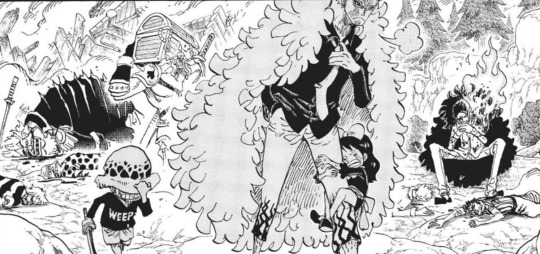
Little Law wanted to destroy the world and everything in it, but thinking rationally, what other choice did this kid have? He had no remaining family, was doomed to die before he hit puberty due to a terminal illness, was perceived as an infectious subhuman that most doctors would’ve sooner tried to exterminate than help. To Law, the world had turned its back on him – considering him a monster for simply surviving. He has all this hatred and pain boiling away with him with no tangible target to direct it towards. And this is the first clear cut rejection of faith that we see in Law. Any concept of a merciful God had just died. What God would allow this? Why is Law alive (a question that he repeats to himself throughout his life), why are these scumbags alive, why is the world going on spinning as if nothing has happened when his whole world had gone up in flames, why does anyone at all get to be here when everything I loved is gone? And it’s far easier to fall into a despondent nihilistic stupor than it is to work through any of that, and what’s the point in trying to process and move on from it, when there’s no hope for a future for Law anyway? When the only thing waiting ahead is more pain? What was this, if not a punishment? He’s supposed to be some messenger for God? How about fuck God, or whatever entity that exists that made him suffer this. Law’s not going to be a messenger for shit, thanks, he’d rather be their monster, he’d rather watch the world burn.
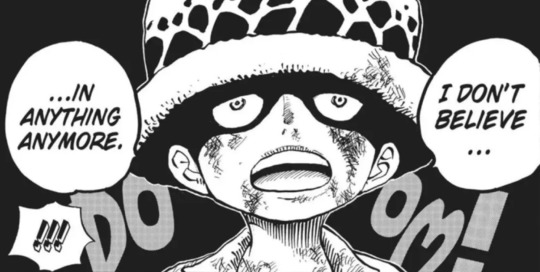
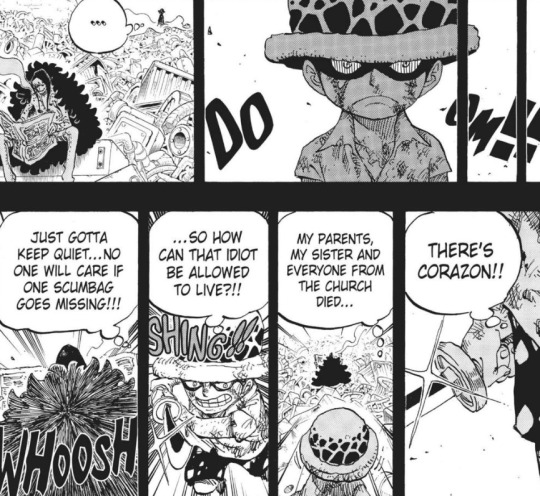
Corazon survives Law’s stabbing and doesn’t rat the little shit out (to Law’s confusion). It’s business as usual for another two years, then, one day Rosinante overhears his true name - Trafalgar “D” Water Law, and everything changes. On the back of his own beliefs, Rosinante dedicates himself to making sure Law a) lives and b) doesn’t become his brother. Law’s relatively short six month stint with Corasan forms the basis of Law’s new creed going forward, and all it took was a bit of kindness, love and humanity when the rest of the world had abandoned him. In the end Rosinante doesn’t save Law for the will of D. and the storm he’s predicted to bring in the future (as Law suspects), but he certainly believes in it, and the strength of Corasan’s conviction transfers right over to Law when he forces the ope ope fruit down the kid’s throat to heal him, tells Law he loves him, then sacrifices himself to set Law free.



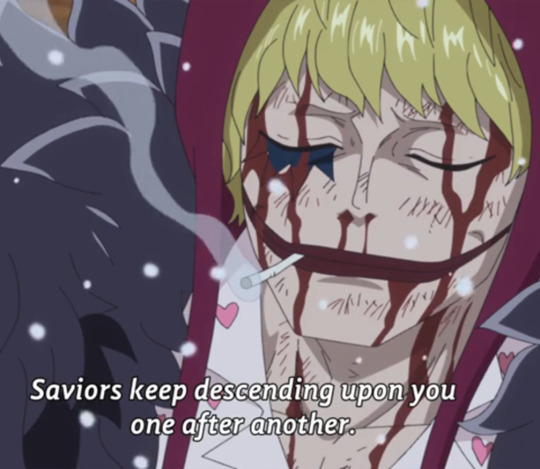
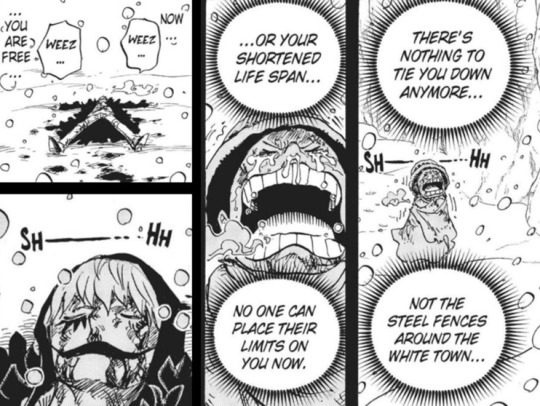
Law clings to that love he was given, he takes all these fundamental teachings and ways of thinking in regards to faith that were drilled into him during his youth, rejects the religion element and applies just about everything else to Corasan. He holds onto the last shreds of what Corasan leaves him with. Corasan becomes his “benefactor” (he gave my my heart), his saviour, his martyr.
And the crazy thing is, Rosinante was never really this saint Law makes him out to be. Law hated the clutz when they first met (mostly on account of Corazon throwing him through a glass window down at least two stories and into a pile of scrap). Corazon initially showed nothing but contempt for his presence (to ward him and the other children away from the Donquixote family, but these are still extreme measures). And it wasn’t until after learning Law’s name that Rosinante dragged him kicking, crying and screaming from hospital to burning hospital (not very saintlike in of itself), even after Law begged him to stop. Rosinante became Law’s saviour partly because of his belief in the will of D., and probably due to some guilt being a Donquixote, but mostly because he has always had a bleeding heart and he pitied (and had very quickly come to love) this angry, sick, deeply lost little kid. All this to say that Law’s faith in Corasan – this saintlike figure Law upholds him as in the future and the lengths he’s willing to go to avenge him/fulfil Rosinante’s purpose reflects the strength of the absolute beliefs Law would’ve been raised with in regards to God.
Whether it be out of survivor’s guilt (just one more body to heap on top of the Flevance pile), his love for Corasan, or for the sake of taking vengeance on the man that took away the one good thing he’d been able to regain in his miserable life, Law adopts Corasan’s will, the will of D. (which in of itself seems divine in nature), incorporates it into his new belief system, actively takes on the role of the divine punisher/justiciar and dedicates his life to bringing down Doflamingo.
3. Luffy
Catholicism dictates that the entirety of someone’s beliefs should be dedicated to one true cause (that cause being God) and expects people to ride on that, letting it carry them through life, give them hope, purpose, etc. But a lot of former Catholics choose instead to find that through something else. Corasan ignited the spark in Law’s faith around the will of D., but it’s not until he meets Luffy that this really becomes something that feels tangible and real for Law.
When Law saved Luffy in Marineford (putting the heart crew in danger for a stranger he met once), he said he did so “on a whim”, but that seems incredibly ooc for Law — this man that pretty much planned out how the rest of his life would go after the dust of Corasan’s death settled and he came to terms with the fact he wasn’t going to die at age thirteen like he’d originally thought. Circling back to the concept of Law being a sole survivor/messenger for God, it is interesting that Law is the one to seek out Luffy (given that Luffy is usually always the one either being abandoned by people or recruiting his crewmates), and Law is ultimately the catalyst for pulling him towards Dressrosa and Wano. There must be a REASON that led to Law deciding Luffy to be the most viable option out of the Worst Generation for an alliance (beyond blind trust in an unhinged captain that just so happens to also bear the initial D, and Luffy being one of the few captains crazy enough to go along with what Law was cooking up).
Law undoubtedly would’ve kept a peripheral eye on Luffy for some time before officially meeting him due to him being a rising competitor pirate and another “D” (I imagine the news of his utterly insane exploits would’ve made good reading material, too). The first time Law lays eyes on Luffy in Sabaody though, he still blows all expectations out of the water — crashing headfirst into the crowd of a slave auction and immediately committing a felony against a member of the most powerful upper one percent.
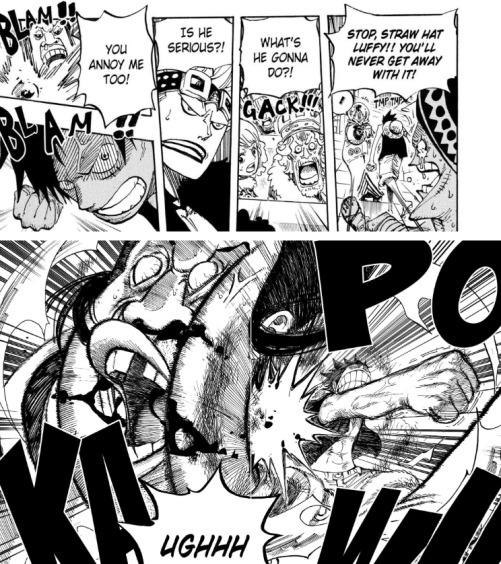

The world nobles are at an “untouchable God” tier in terms of class standing and believe it’s only natural for them to be entitled to whatever and whoever they want in this world that’s beneath them – the same kind of self-aggrandizing false divinity that Law has a a lot of repressed rage towards and that the will of D. is fated to oppose, so this, understandably, is a highly compelling first encounter, but it’s really only an initiating factor for what ultimately draws Law to Luffy. From their very first meeting (and probably before then, in the news stories and rumours Law likely picked up on), it’s made abundantly clear that Luffy does what he wants without a second’s hesitation, no matter the consequences, simply because he feels it is the right thing to do. Some call this an iron will, Law would be more inclined to call it willful stupidity and trouble, but time after time Luffy somehow manages to pull off what Law would best describe as “miracles”. And Law believes the straw hats just might be the ones to drum up another one for him.
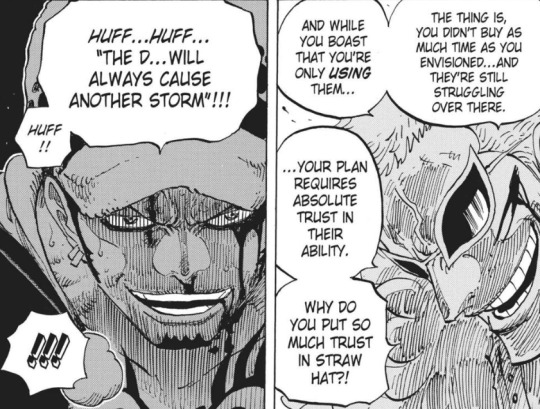
Luffy’s also got a lot of passing resemblances to Corasan going for him, e.g. inherently kind, compassionate liberators with big dumb hearts and wide goofy smiles in spite of everything they’ve been through, treating Law as nakama and saving his life despite his protests etc. All of which I’m sure Law hasn’t been completely unaffected by despite the high walls he puts up. And the more Law learned about Luffy the more it probably became clear that he is the antithesis to Doflamingo, i.e. what makes Luffy so goddamn dangerous and terrifying beyond his physical power is his ability to make friends with a simple kind of unconditional love that gets reciprocated enough so that these friends are willing to die for him.
Luffy agrees to the alliance, they successfully blow up Caesar’s base, and head off to Dressrosa. Now’s the time I should bring up that it’s taught in Catholicism that self sacrifice is the ultimate heavenly deed, and here Law is undoubtedly prepared to be a martyr for his cause. Law sends away his crew to Zou before Punk Hazard with the expectations that he’d never see them. He cultivates a fierce emotional detachment against Luffy’s willingness to bring him into the fold of the straw hats, and is resolute in that when the time comes, he will handle this himself, he will carry out Corasan’s will, and if he has to die for it, he will die with Corazon’s name plastered on his back. (Note here that Christianity is contradictory in that Law being this ready to die here is a sin, because revenge and suicide are highly discouraged, so you could say that by avenging and dying for his saviour, Law would be committing both the ultimate sacrifice and the ultimate sin).
Things get very dicey for Law in Dressrosa, to put it lightly. Doflamingo reveals that he was a celestial dragon (linking back into the will of D. “enemy of the Gods” notion), puts Law on the backfoot and gives him a thorough beating before shooting Law with a couple dozen white lead bullets in front of Luffy (because even when he’s winning Doffy loves to be a cunt about it). By the time Doflamingo is cuffing Law to the heart seat, it’s all looking pretty grim, and it’s very apparent when Luffy shows up to save him, that he is ready to die.

Law here has given up. He spent years planning his revenge for Corasan, but he lost, and he has very little left in the tank (physically, emotionally, spiritually). But Luffy doesn’t listen. Luffy who doesn’t think, doesn’t care, who trampled all over Law’s carefully laid out plan from the get-go and who is willing to take on Doflamingo single handedly for the simple slight that he dared to harm Luffy’s friend Law. Law will never find peace in his own demise because Luffy doesn’t do peaceful. He does loud and unashamed and open with no rhyme or reason other than the excruciatingly simply fact that he loves people and he thinks the people he loves deserve to have good lives. Luffy chucks Law over his shoulder and drags an injured Law across the city despite his protests (sound familiar?) and in the process inspires the fighting spirit in Law again.
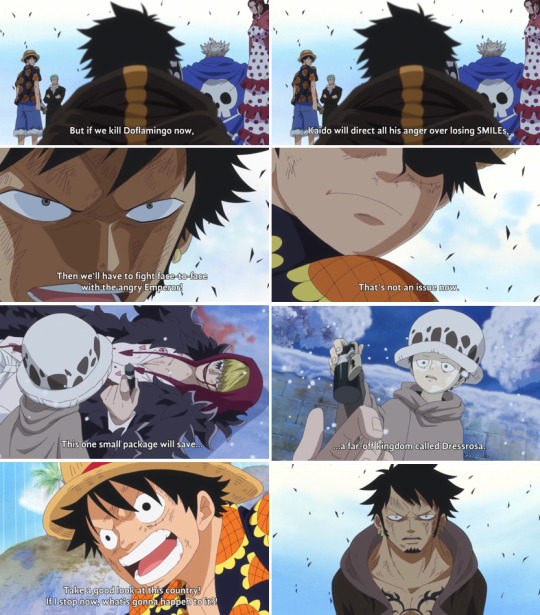
When Law confronts Doflamingo again with Luffy in tow, Law’s faith in Luffy confounds him. The last Doflamingo remembers of Law is this beautifully moldable dark pit of grief and rage who’d given up on believing, period – who wanted the world destroyed. Not so long ago, Law had been a candidate for Doflamingo’s next protégé. Now?
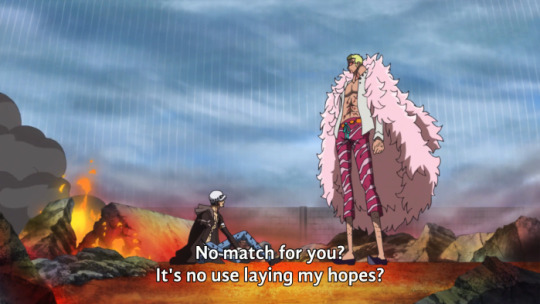
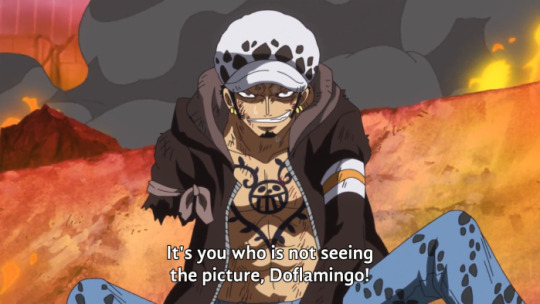

THIS is the action (grinning, staring down the barrel of a gun, flipping Doffy off as he tells him in not so many words that he may kill Law but he will never beat Luffy), Law’s unshakeable faith in the face of his own death is what has Doflamingo realising he will never regain control of Law again – is what incites Doflamingo to go from breaking Law down so he can build him back up again, to conceding defeat and outright killing him.
The trust that Luffy inspires in Law and the way he talks about Luffy (Luffy being this powerful, miracle-inducing liberator that Law can’t comprehend but follows anyway, Law laying down his hopes on him, weaponizing the will of D. to try and provoke fear from Doffy), is very reminiscent of the awe and faith talked about in scripture. Law discovers the feelings of comfort and hope that Catholicism was supposed to give him in Luffy, but Law’s belief in Luffy is a direct rejection of those teachings. Rejection by believing in a real life person as opposed to the divinity he was taught about. He’s also cementing his belief in the will of D., thus rejecting Doflamingo and all the people that embody the sort of “all powerful” divinity that he abhors (i.e. celestial dragons, Kaido, the Gorōsei/five elders) for the embodiment of hope and humanity.

When Law survives (again), he expresses he’d rather see Luffy beat Doflamingo with his own eyes or die with Luffy if he loses than leave. Then he watches, after all this talk of miracles, looking up in reverence as Luffy delivers, bright as the sun, haloed by the bars of a cage that’s haunted him for over a decade, Corasan’s words echoing at the back of his mind. God had never saved or freed Law, but Corasan was there for him, the heart crew was there, Luffy was there. And this is Law’s biggest, clearest rejection of religion – this newfound faith in humanity.
This faith in Luffy is put to the test again in Wano when Luffy is struck down by Kaido, but Law never truly stops believing that he’ll make a comeback. Even when the straw hats doubt whether he’s alive or not, something tells him Luffy’s not dead, and he holds onto that hope.
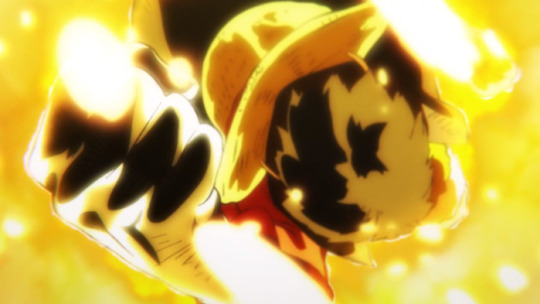


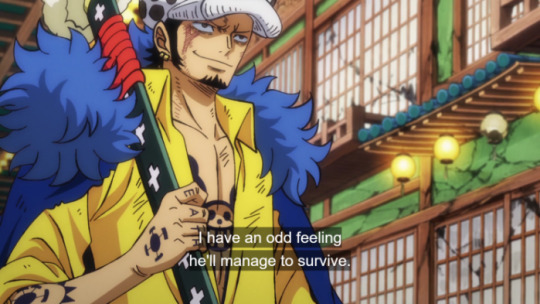
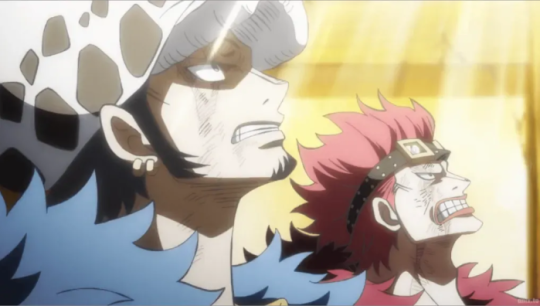
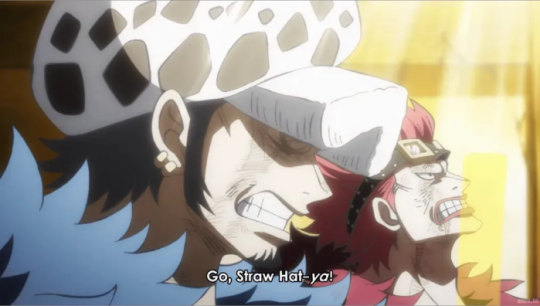
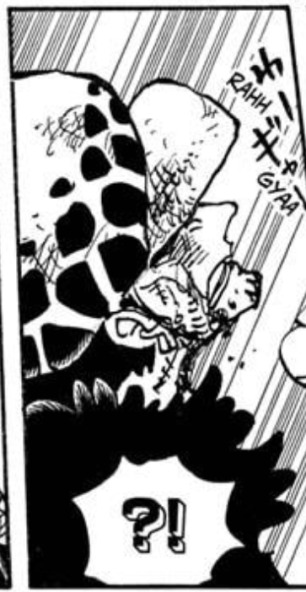

We also have the whole nika/joyboy backstory which really only reinforces all of this imagery/god-fearing looks of awe from Law and this idea of Luffy who is this perfect juxtaposition of empathetic and kind to incredibly fearsome fire and brimstone fighter. And regardless of whether you’re into the ship or not this is the impetus of Law’s relationship with Luffy for me, because here’s Luffy who has every right to have a chip on his shoulder and be downtrodden about all the injustices against him, here’s this little guy who against all odds, in the darkest of places, embodies light and hope and kindness and proves to Law that there will be hard times but there IS a happy ending at the end of the tunnel, despite it all. And everytime Luffy rises to the insurmountable challenge and wins, it just further cements that the will of D. is alive, that Corasan was right, that there's something redeemable in Law, a reason why he was worth saving, even if Law doesn’t understand it quite yet.
#merry christmas law religious trauma be upon ye#what’s an endearing idiot to a non-believer#long post#favourite character thesis statement. or something#ive been wanting to talk about this for a while but just been gathering my thoughts#will preface all this by saying I was not born or raised religious but the concept’s all very compelling from an outsider’s perspective#but I have had conversations about this to people like lesbianluffy who *were* raised catholic and relate to this experience#who I have to thank a lot for helping me wrap my head around this#this is a compilation of thoughts and conversations over the last two or so months#one piece#op#CJ's op watch-through#trafalgar law#monkey d. luffy#donquixote rosinante#donquixote corazon#monkey d luffy#lawlu#trafalgar d water law#gear 5 luffy#sun god nika#wano spoilers#lulaw#op meta#op analysis#one piece analysis
425 notes
·
View notes
Text
Start again
The last day of the year is a good time for a little perspective. To take stock of things. To look at how you’re doing. And where you are.
Are you where you hoped you would be? Did things work out the way you wanted them to?
More importantly, are you where God is calling you? Are you doing what God is calling you to do?
Be honest with yourself. If your answer is “not really,” then maybe it’s time to rethink what you’re doing.
But don’t waste your time beating yourself up about it.
As St. Francis de Sales says, “Have patience with all things, but chiefly have patience with yourself.”
Use today to focus on what really matters – reconnecting with God.
That’s the part that has to come first. If you don’t have God as your foundation, none of the rest of it will matter.
Set yourself up for a great year by using today well.
Reconnect with God.
Then start again.
Today’s Readings
#New Year's Eve#Reconnect with God#Start again#Perspective#God#Jesus#Catholic#Christian#Church#Catholicism#Christianity#Moments Before Mass
27 notes
·
View notes
Text
Become a vessel of His Word. Let your story be His story of victory so others may continue to hope in His love.
#hope#love#faith#inspiration#christian#blessed#believe#catholic#write#praise#read#ponder#reflect#self reflecting#reflection#perspective#focus#pray#prayer#salvation#jesus#team jesus#jesus christ#christianity#blessing#scripture#bible#god#god is merciful#lord
30 notes
·
View notes
Text

echoes of truths that once rang clear, by bowblade
Fandom: Final Fantasy XIV Relationships: Original Final Fantasy XIV Characters/Artoirel de Foretemps Rating: M Wordcount: ~55,000 words, 10 chapters
"You were, mine and your father's, brightest star. It is why we named you. Estelline."
Much as you wish it, love is not always enough, although it endures.
To lose everything held dear is to have a heart that still cares. In the fallen snows of Coerthas, a falsely accused Dragoon turned Convictor must make her father's amends, and find her own answer.
Read at AO3.
#final fantasy xiv#heavensward#artoirel de foretemps#ffxiv#ffxiv fanfiction#a story about one of my wol's retainers and a retelling of heavensward from her perspective :) i am not immune to catholic elves in love#artoirel is the mr darcy of ishgard and i will elaborate
10 notes
·
View notes
Text
i cant stop thinking about conclave ive gotta see it again 😭
i am catholic, actually, and conclave caught me in a troubling moment with faith ig, i wasnt exactly doubting, just going through something around doing enough, and it really hit me right
beautiful beautiful movie been reassuring all my family members that receive whatsapp messages against it that its really respectful of catholicism and has the pope's choice beautifully inspired by god, theyd disagree if they watched but well for me its the truth
i wanna try watching it with a non-catholic perspective, maybe? i dont know much about the book, but its an american film so i know this isnt a ~catholic~ movie but well their believes in the church and god was really present for me as well as the belief of holiness of both the late pope and benitez for me strengthen the end so i definitely dont know how i could do that
god i cant stop thinking about conclave so so beautiful
#conclave#great film#i know that much of the non catholic perspective is gay shipping#i particularly dont feel well consuming content with priests breaking their vows#or with sexy in churches#so not engaging in the gay shipping this time#but its okay really#as my friends father said while trying to get him to come out of the closet 'most of the priests we know are gay'
11 notes
·
View notes
Text
i found out about the pope when i got woken up by my roommate sending this in a gc.
no further explanation needed

#rip Pope Francis#he was considered progressive and tbf he Is chiller than his predecessors#but he ALSO did some very sketchy shit#long rant incoming so sorry in advance:#and it’s disheartening that basic human decency is seen as ‘radical’#like. the FOUNDATION of Christianity is unconditional love for thy neighbor.#‘following God’s word’ means going against the grain by embracing everyone#in SPITE of hateful disapproval and widespread bigoted ideologies#Jesus canonically *passionately disavowed* prejudice in all aspects#but no ppl have turned the church into a political weapon#bc feigning moral superiority is so much more comfortable than radical acceptance#i say this as a veteran of 10 years of Catholic school#(i’m not Christian btw i’m just offering my perspective)#(also ik that not every Christian is Like That!! i don’t hate the Entire church/congregation)#destiel#pyrotabby talks
7 notes
·
View notes
Text
**Cracks knuckles and wades into The Discourse**
"Can atheists be culturally Christian?" is entirely the wrong question.
Of course they can! Plenty of people don't believe in the religious doctrines of Christianity, but still do things like celebrate Christmas or Easter, have church weddings, and other culturally Christian activities. Take for example, me -- I'm a Deist who is also culturally Christian. Christianity is the religious lens I understand best, even if I don't necessarily agree with it.
Plenty of atheists and broadly-secular people who live in majority-culturally-Christian places, like most of the U.S., also are often oblivious to the Christian basis of their cultural practices, and may think of culturally Christian practices are "universal" or "secular" or "for everyone." This comes up every time someone brings up the inappropriateness of public schools/places celebrating Christmas, when people come out of the woodwork to insist that of course Christmas isn't religious, they know plenty of secular people who celebrate it! (Note: This is often blamed on ex-Evangelicals, but I don't think that's fair. Ex-Evangelicals know what Christianity is. This is something I see more from people from secular families in mostly-secular areas who don't think about religious diversity because it's not relevant to their lives.) (Additional Note: Do not @ me with "WELL, ACTUALLY, Christmas is PAGAN--" No. Your history is oversimplified and bad. You are not celebrating Yule. You are not celebrating Saturnalia. You are celebrating Christmas, a heavily secularized Christian holiday with some cultural influences from European Pagan traditions.)
Additionally, many atheists/secularists/non-religious-people whose primary reference point for religion is Christianity (whether because they're ex-Christians themselves, or just because that's what they know from cultural osmosis) make broad, inaccurate assumptions about All Religion based on their projected understanding of Christianity, e.g. "I'm not religious because I don't believe that an omnipotent God controls everything in the universe and rewards or punishes people when they die." Okay, cool, but not all religions teach that, not all religious people believe that, not even all Christians believe that.
So, of course atheists can be culturally Christian, maybe without realizing it or thinking about it. Anyone who says they can't isn't paying attention! And that's why "Can atheists be culturally Christian?" is entirely the wrong question.
The right questions are "Is it reasonable to assume by default that anyone who lists their religion as 'atheist' or 'none' must actually be culturally Christian?" and "Is it reasonable to blame anything you don't like on 'cultural Christianity'?" and no! It's not!
Sometimes simply does not have a religious affiliation. And that's okay! There is a tendency to interpret "none of the above" as "Oh, so, the default thing, but a milder version of it," and that is... not accurate.
There's this vague sense that non-religious people aren't really a religious minority, that they're really just play-acting at being religiously marginalized, because after all, they're actually just non-devout Christians. Discrimination against non-religious people doesn't necessarily look the same as discrimination against religious people (like, there aren't atheist holidays that people are being denied time off work for), but it's still very real, and falls the hardest on non-religious people with the fewest cultural ties to Christianity, the very people erased by "Atheists are just cultural Christians" discourse.
Furthermore, the traits and beliefs and ideologies and biases that get called "culturally Christian" are often not actually unique to Christianity at all. Certain concepts, like an emphasis on redemption through death, are culturally Christian (although even that one is sometimes found in other religions), but to hear the people calling everything "culturally Christian" tell it, no other religion, culture, or philosophy on Earth has ever believed in virtue ethics, valued hard work and stigmatized "laziness", or been judgmental about petty infractions. Nor, I can't believe I have to say, is "Christians do it, so it's bad" a good argument against things like freedom of conscience or disability rights (neither of which are even especially popular among Christians).
The problem with way people are talking about "cultural Christians" isn't that atheists or other non-Christians can't be culturally Christian (of course they can) or that Christianity doesn't have pervasive influence in majority-Christian societies (of course it does). The problem is that people are using "culturally Christian" in inaccurate and nonsensical ways.
#discourse#comparative religion#religion#christianity#atheism#cultural christianity#usually on forms if there's not a 'deist' option I put 'catholic' because I'm closer to a 'bad catholic' than I am to atheist/agnostic#I guess I could be agnostic since I don't “know”#but that feels too certain about not knowing#I'm more like#there are known unknowns and unknown unknowns#remember that one?#I don't often talk about religion and spirituality from a perspective of myself#I more talk about social issues like religious freedom#but I felt like I should list my own standpoint#I am quite culturally Christian actually! But that's only tangentially connected to my opinions on rights etc!
42 notes
·
View notes
Text
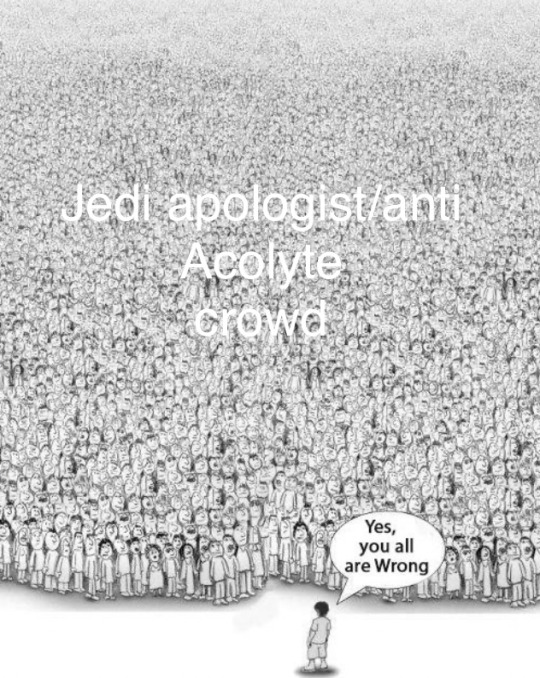
#indigenous tag#pro sith#jedi critical#star wars tag#star wars meta#anti george lucas#george lucas critical#renew the acolyte#indigenous pro sith#indigenous jedi critical#sith defensive#sith adjacent#star wars is built on opposing viewpoints interpretations and perspectives#learn to take opposing views for once you weirdos#order 66 was not a genocide#the jedi were catholic fucking psychos and whoever told you different plain ol’ lied#anti jedi#the acolyte#fuck the jedi#star wars
18 notes
·
View notes
Text
Love one another
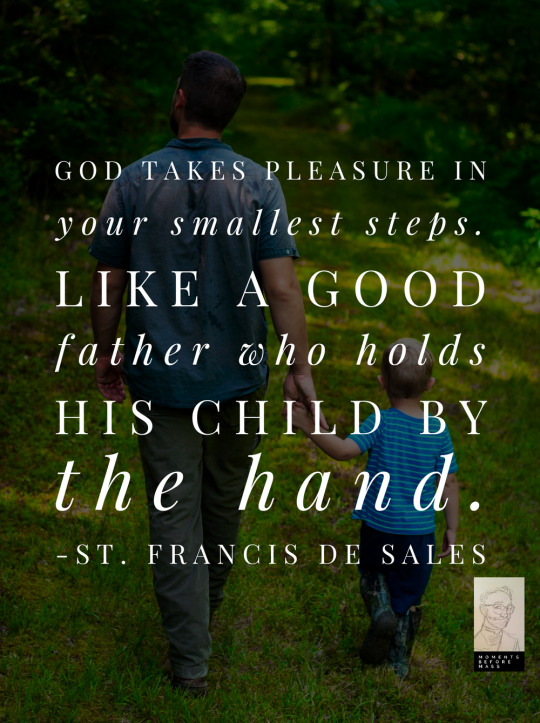
“This I command you: love one another.”
That’s how today’s Gospel ends, with this commandment from Jesus.
Think of all of the things that God has commanded throughout history. Things like building an ark, leaving everything and going somewhere you’ve never been, offering sacrifices, etc.
Next to them, “love one another” sounds pretty easy. Until you actually try to do it.
Because there are two people who are going to make this difficult, who are going to make it hard for us to love one another. The people we’re trying to love. And us.
The people we’re trying to love won’t make this easy. Because they’re people. And people do stupid, horrible, unloveable things. All. The Time.
And yet, we’re called to love them. Without exception. Not just when they make it easy, but without exception. Even when they’re at their most unloveable.
Which is something that you and I can never do (not for long) without God’s help. If we’re smart, we won’t even try to do it on our own.
But when it comes to loving one another, you and I are an even bigger problem. Mainly for two reasons.
First, because we don’t know where to start. It would be nice if Jesus gave us some details. Maybe even a plan. But no. We just get told to do it.
That’s actually enough. Because we don’t need an elaborate program (“5 easy steps to loving one another”).
As St. Frances de Sales (today’s saint) tells us, “you learn to speak by speaking, to study by studying, to run by running, to work by working; and just so, you learn to love by loving. All those who think to learn in any other way deceive themselves.”
And there’s the other reason. Knowing that it’s going to be trial and error, knowing that we’re going to make mistakes learning how to love? That sets us up to “what-if” ourselves, to second guess ourselves, to endlessly critique our first faltering steps. To the point that we just stop even trying.
The reason this happens? It happens when I trust the least reliable person in the world to give me advice on how I’m doing. It happens when I listen to me, the one person who can never give me an objective perspective on me.
This is absolutely the wrong perspective for me. Why?
Because I didn’t command me to do this. God did.
Which means that I have no business judging the quality of my performance. God alone determines whether it’s good enough. God sets the standard.
Which sounds even worse, until you find out what God’s standard really is.
“God takes pleasure in your smallest steps. And like a good Father who holds His child by the hand, He will accommodate His steps to yours and will be content to go no faster than you. Why do you worry?” – St. Francis de Sales
Today’s Readings
#Smallest steps#Worry#God's Perspective#God's Love#God#Jesus#Catholic#Christian#Church#Catholicism#St. Francis de Sales#Moments Before Mass
20 notes
·
View notes
Text
tbh me as a paladin fan, this entire thing with Eldanwyn did make me teary
#also THIS stuff with Eldanwyn is a perspective of faith and what it means to serve the divine in faith that is familiar to me as a Catholic#and was the exact perspective I was drawing from whenever I talked about religion and faith in C3#Critical Role things#CR spoilers
18 notes
·
View notes
Note
Heyyyy RJ. I'm working on a huge comprehensive post about the theology of the Sides, biblical hermeneutics, hamartiology, anthropology, and etc. An area that I originally wasn't going to touch on at all, was the areas of intersex people and trans theology, because on the one hand I don't experience this for the most part and on the other I am just sorrowfully lacking in any knowledge about it.
Long story short: since you seem to know a lot about these things could you inform me of your approach towards gender, sex, intersex people, and trans theology?? Thank you, very much appreciated <333
Of course! For reference, though, I am not well-read (academically) on the topics, but they are something I think of, pray about, and encounter fairly often, so if any other intersex or trans people have any further theological sources or reading to suggest, I would appreciate it. I am speaking from the perspective of a USAmerican cradle (Roman) Catholic with very poor catechesis. I hope this is informative or at least inspires your own research on the topic; I’m happy to answer any more specific questions to the best of my ability.
(Funny enough I had a post in the queue on this topic, so I've transplanted a lot of it to this post).
Firstly, I came to interact with the intersex community, and by extension gender's intersection with theology, because I am disabled. I was born with a debilitating congenital birth defect, and went through the combined medical pressure to 'be fixed' and the spiritual frustration of being made 'imperfect' by a perfect God. The generally accepted answer from the Church is that the fall corrupted nature, and therefore disability and birth defects exist - not as a punishment or transferred guilt from Adam, but simply as a part of our fallen world, just like death. That is not a very satisfying answer when you're 9 years old and can't walk or run or play with the other kids.
Personally, my parents shielded me from medical professionals who wanted me to submit to some pretty drastic procedures for a child to go through. When a doctor suggested a surgery, my parents would explain to me what would happen and how it might help or hurt me. I denied almost every optional 'quality of life' surgery offered, and that decision - even as a child - was respected. Intersex people, especially children, do not have that kind of informed consent or support. (A lot of disabled people also lack in this support and understanding, I just happened to be one of the lucky ones.)
I should also note that my birth defect is very rare - literally rarer than 1 in a million - making it much rarer than intersex conditions, including ambiguous genitalia observable at birth. The argument that intersex conditions* are 'rare' and therefore 'intrinsically either male or female' is a gross simplification and erasure of their physical and social reality. As far as the statistics, just how many intersex people are born are inherently skewed toward rarity. Many countries and cultures still permit or encourage the killing of intersex infants at birth, and there is a documented history in the US of intersex infants having their genitals cosmetically altered at or soon after birth (sometimes without the parents' knowledge or consent). Furthermore, some intersex conditions aren't apparent until puberty, and many young intersex people are lied to by their family and doctors about their condition. Therefore, the justification that intersex people are 'rare' and therefore don't need theological accommodation is inherently flawed. Even if intersex people are exceptionally rare, like my condition, the Church doesn't teach that I needed to submit to medical 'correction' to live a 'normal' life. My naturally disabled life is of individual and intrinsic value. The Church failed to extend this understanding and compassion to the intersex community.
Currently the Church's teaching on intersex people is murky at best - from my personal research. The 'intrinsic' nature of gender is dogmatically limited to either male or female, reflecting man-made social constructs and tradition, not nature and God-given identity. Is it the 'intrinsic' nature of humanity to be abled-bodied? Should disabled people therefore make every possible effort to present as abled-bodied? Of course not - so, why do we demand intersex people pick an 'intrinsic' gender to present with? (Hint: intersexism.) The idea that intersex people with ambiguous genitalia - and remember, not all intersex people have ambiguous genitalia - need 'corrective' surgeries for their genitalia is fearmongering medicalization. Very rarely does ambiguous genitalia impede necessary bodily functions, and when it does, surgery to correct the urethral opening does not necessitate the extent of cosmetic changes these medically necessary surgeries supposedly require - as though the addition of prosthetic testicles is at all tied to a person's ability to urinate.
Until the Church meaningfully convenes with, recognizes, and celebrates the God-given intrinsic nature of the intersex community, there can be no settled theological value assigned to gender.
This doesn't mean that I dismiss the theological importance and value of the perisex* cisgender male and female genders. The Word Incarnate came in the form and likeness of a 'man,' and I respect that the priesthood reflects that. The (potentially) procreative nature of sex being limited to a married 'man' and 'woman' also falls within my understanding and respect for Church teachings on intimacy. However, I think theological values need to be extended to and evolved to include intersex people who don't transition to present as a perisex man or woman.
Which therefore also extends to trans theology. If we cannot accept and understand diversity given by God at conception and birth, we cannot have an informed and theologically solid interpretation of transition later in life. Hence its even murkier status - and by social and cultural hang ups, its negative bias - in Church teachings. The Church permits abortions for ectopic pregnancies as a medical necessity as determined from years of medical study as the best and most life saving option, but the transition of a severely dysphoric* person is not seen as medically necessary in spite of years of similar research and support?
I guess that's the crux of my approach to gender with reference to intersex and transgender issues. If it is natural - and it is - then regardless of rarity it is God-given individuality that should be theologically affirmed and celebrated. If it is medically necessary - and for trans people, transition is the best modern treatment - then it should be permitted by the Church. The merger of these two concepts, natural diversity and medical necessity, cannot be theologically dissected and discussed until they are individually accepted by the Church.
I was born disabled - not in a disabled body, not with the wrong skeletal structure - I am disabled. It's not a dirty or bad word, and it doesn't mean I'm intrinsically broken or need to be fixed. The intersex community has fought long and hard for recognition of their individual value, and the Church must respect and celebrate that if it wants a cohesive theology on gender.
The soul and the body are not mirrors but complements. If they were mirrors, then does my physical disability present in a spiritual limitation or flaw? No; they complement each other and any dissonance between the two is created by the fall of man - like Death, which separates body and soul, and is therefore abhorrent to God and human nature alike. Is it wrong to administer medical attention to the terminally ill or dying? No; we administer medical attention with the knowledge that we cannot cure death but that we can offer bodily comfort. And we shouldn't try to 'cure' death - only God can do that, and will do that, at the second coming. It's a bit dire of an analogy, but similarly, we should administer the same compassion and care to our transgender siblings. You cannot 'cure' them, but you can make their bodily life easier, more comfortable, and more joyful.
intersex* - Intersex conditions can vary from alternative hormonal expression to chromosomal differences to mixed sex characteristics. The intersex community includes a variety of presentations, including those invisible to external medical observation. (You do not know who is intersex just from looking at or speaking to them.) Focusing on and defining these conditions by the potential medical complications of intersex development is intersexist and leads to extensive medical abuse. It would be ridiculous and exclusionary to defined perisex cisgendered women as those who have required a cesarean section. It is just as ridiculous and narrow-minded to define intersex individuals as those with ambiguous genitalia that required medical intervention at birth to allow for normal bodily function. Here's some Intersex 101 resources for those who want to learn more.
gender dysphoria* - Some transgender individuals do not experience gender dysphoria and the medicalization of the trans community, like the intersex community, is rife with disagreements and the high potential to withhold treatment and medically abuse individuals that do not perfectly meet strict conditions. With the Church's failure to acknowledge and include intersex people, this nuance cannot be addressed with our current limited dogmatic and theological understanding of gender.
perisex* - This term simply means the opposite of intersex, synonyms include dyadic or endosex. A perisex person has sex characteristics that 'match' their 'sex chromosomes.' Eg. a woman with XX chromosomes and a normally developed uterus, ovaries, vagina, etc. and an estrogen dominated endocrine system or a man with XY chromosomes with normally developed phallus and testes and a testosterone dominated endocrine system.
** Not mentioned above, but for reference the word h*rmaphrodite and variations thereof is a derogatory slur for intersex individuals. Just because a word is medically used, like r*tard, doesn't mean it should be used either medically or colloquially. More accurate scientific descriptors appear in any specialized biological field (monoeicious for trees, cogenital for some invertebrates, etc.) making the use of the h slur not only offensive but often inaccurate in scientific contexts. Just use intersex or if you’re specifically talking about ambiguous genitalia, just say ambiguous genitalia. If you didn't know, now you do - one of today's lucky 10,000!
#tower of babble#christianity#catholic#lgbt#intersex#trans#transgender#i reiterate that I am not academically read on these topics im just speaking from the personal perspective#of someone who a. relates to and sympathize deeply w the intersex community and b. finds current Church perspectives lacking#both in compassionate consideration and in theological support#'God made them male or female' yeah well 'in Christ there is neither male nor female' so. uno reverse i guess.#can we not focus on quippy bible quotes and have a serious conversation INCLUDING the parties we're so quick to use as political props?#stop speaking over them and let them speak for themselves
12 notes
·
View notes
Text
i wish i couldve done more with daisy, shes very fun to me. i ❤️ gay but homophobic characters and daisy just didnt get a chance to shine as much as she does in my head
#racing!#when ur a girl in love with ur best friend but ur bedt friend is Also a girl and u were raised catholic#daisy Did like june. like a Lot. she just didnt know how to cope with it#if i couldve done split perspective ..... god#if i had the Room to do split perspective in one book for capstone i wouldve been so fuckibg strong. alas#idk if ill ever do a book for daisy but man the idea is tempting#i put too much of myself in june and it made me hate her a lot..... lol...... sorry june .....#my favorite character to ddaw was Not u.......and my fav character to write or think about is extremely not u........
7 notes
·
View notes
Note
I swear the notes on your post just need someone calling you a "reddit atheist" to complete the modern day christian apologist bingo.
Stopped checking much after the bizarre 'people who HOPE good stuff happens are always morally superior' 'hope is always good' stuff of all things. These are pretentious vague statements that can not just be applied to every single thing in the world! A gambling addict betting all of their life savings *hopes* they are about to win so much they will pay off all their debts! Sure hope can be a source for motivation to change the world for some, but it can also be a source of delusion and frustration and horrible decisions. And I dont't think it is a moral failing to have more existentialist approach towards life and believe in doing the right thing despite you feeling like it is pointless and people who talk big game about 'feeling hope' are necessarily all some revolutionaries and never just people with superiority complex talking corny and pompous. But ok its semantics, but its particularly weird in context of the pope and the catholic church. How does your 'hope' influence cardinals' choices at conclave? Are you a cardinal with the right to vote yourself? Do you even know a cardinal personally well enough to influence their choice? Catholic church has one of the most archaic hierarchical centralized structures out of organized religions, what is exactly your realistic strategy for influencing them? 'Hope ✌️'? Catholic church is getting kinda less relevant and powerful in most of europe comparing to south america and new converts in africa, so they are looking for a guy at least somewhat related to latam but still white and lowkey of italian descent that isnt as diehard of a conservative nutjob like john paul 2 that was an image disaster for the catholic church (but that doesnt mean his teachings on condoms being 'civilization of death' are irrelevant to catholicism) but still 'moderately' conservative but keeping it on the low not talking about it openly too much. Thats why they went for francis 'being gay is not a sin but gay sex is' bergoglio and prevost, like thats who they want as their official or stunt lol, its not a coincidence
6 notes
·
View notes